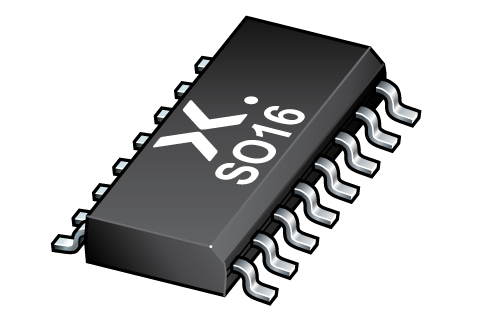可订购部件
| 型号 | 可订购的器件编号 | 订购代码(12NC) | 封装 | 从经销商处购买 |
|---|---|---|---|---|
| HEF4017BT | HEF4017BT,653 | 933372700653 | SOT109-1 | 订单产品 |
试用我们种类齐全的评估板,体验我们的设备及其性能。深入了解我们的产品如何助您提高效率、稳健性和可靠性,让您的应用大受裨益。您可以在这里找到聚焦在应用、封装和不同的 Nexperia 产品的评估板。

Register once, drag and drop ECAD models into your CAD tool and speed up your design.
Click here for more information5-stage Johnson decade counter
The HEF4017B is a 5-stage Johnson decade counter with ten spike-free decoded active HIGH outputs (Q0 to Q9), an active LOW carry output from the most significant flip-flop (Q5-9), active HIGH and active LOW clock inputs (CP0, CP1) and an overriding asynchronous master reset input (MR).
The counter is advanced by either a LOW-to-HIGH transition at CP0 while CP1 is LOW or a HIGH-to-LOW transition at CP1 while CP0 is HIGH (see Table 3).
When cascading counters, the Q5-9 output, which is LOW while the counter is in states 5, 6, 7, 8, and 9, can be used to drive the CP0 input of the next counter. A HIGH on MR resets the counter to zero (Q0 = Q5-9 = HIGH; Q1 to Q9 = LOW) independent of the clock inputs (CP0, CP1).
Automatic counter code correction is provided by an internal circuit: following any illegal code the counter returns to a proper counting mode within 11 clock pulses.
Schmitt trigger action makes the clock inputs highly tolerant of slower rise and fall times.
It operates over a recommended VDD power supply range of 3 V to 15 V referenced to VSS (usually ground). Unused inputs must be connected to VDD, VSS, or another input.
Automatic counter correction
Tolerant of slow clock rise and fall times
Fully static operation
Wide supply voltage range from 3.0 V to 15.0 V
CMOS low power dissipation
High noise immunity
5 V, 10 V, and 15 V parametric ratings
Standardized symmetrical output characteristics
Complies with JEDEC standard JESD 13-B
HBM: ANSI/ESDA/JEDEC JS-001 class 2 exceeds 2000 V
CDM: ANSI/ESDA/JEDEC JS-002 class C3 exceeds 1000 V
Specified from -40 °C to +125 °C
| 型号 | VCC (V) | Output drive capability (mA) | Logic switching levels | tpd (ns) | fmax (MHz) | Power dissipation considerations | Tamb (°C) | Rth(j-a) (K/W) | Ψth(j-top) (K/W) | Rth(j-c) (K/W) | Package name |
|---|---|---|---|---|---|---|---|---|---|---|---|
| HEF4017BT | 3.0 - 15 | ± 2.4 | CMOS | 40 | 30 | medium | -40~85 | 91 | 9.3 | 50.8 | SO16 |
| Model Name | 描述 |
|---|---|
|
|
| 型号 | 可订购的器件编号,(订购码(12NC)) | 状态 | 标示 | 封装 | 外形图 | 回流焊/波峰焊 | 包装 |
|---|---|---|---|---|---|---|---|
| HEF4017BT | HEF4017BT,653 (933372700653) |
Active | HEF4017BT |

SO16 (SOT109-1) |
SOT109-1 |
SO-SOJ-REFLOW
SO-SOJ-WAVE WAVE_BG-BD-1 |
暂无信息 |
| 文件名称 | 标题 | 类型 | 日期 |
|---|---|---|---|
| HEF4017B | 5-stage Johnson decade counter | Data sheet | 2024-08-08 |
| AN11051 | Pin FMEA HEF4000 family | Application note | 2019-01-09 |
| AN90063 | Questions about package outline drawings | Application note | 2025-03-12 |
| SOT109-1 | 3D model for products with SOT109-1 package | Design support | 2020-01-22 |
| Nexperia_package_poster | Nexperia package poster | Leaflet | 2020-05-15 |
| SO16_SOT109-1_mk | plastic, small outline package; 16 leads; 1.27 mm pitch; 9.9 mm x 3.9 mm x 1.35 mm body | Marcom graphics | 2017-01-28 |
| SOT109-1 | plastic, small outline package; 16 leads; 1.27 mm pitch; 9.9 mm x 3.9 mm x 1.75 mm body | Package information | 2023-11-07 |
| HEF4017BT_Nexperia_Product_Reliability | HEF4017BT Nexperia Product Reliability | Quality document | 2025-03-20 |
| SO-SOJ-REFLOW | Footprint for reflow soldering | Reflow soldering | 2009-10-08 |
| SO-SOJ-WAVE | Footprint for wave soldering | Wave soldering | 2009-10-08 |
| WAVE_BG-BD-1 | Wave soldering profile | Wave soldering | 2021-09-08 |
The Nexperia Longevity Program is aimed to provide our customers information from time to time about the expected time that our products can be ordered. The NLP is reviewed and updated regularly by our Executive Management Team. View our longevity program here.
| 文件名称 | 标题 | 类型 | 日期 |
|---|---|---|---|
| SOT109-1 | 3D model for products with SOT109-1 package | Design support | 2020-01-22 |
| Model Name | 描述 |
|---|---|
|
|
| 型号 | Orderable part number | Ordering code (12NC) | 状态 | 包装 | Packing Quantity | 在线购买 |
|---|---|---|---|---|---|---|
| HEF4017BT | HEF4017BT,653 | 933372700653 | Active | 暂无信息 | 2,500 |
|
作为 Nexperia 的客户,您可以通过我们的销售机构订购样品。
如果您没有 Nexperia 的直接账户,我们的全球和地区分销商网络可为您提供 Nexperia 样品支持。查看官方经销商列表。
The interactive datasheets are based on the Nexperia MOSFET precision electrothermal models. With our interactive datasheets you can simply specify your own conditions interactively. Start by changing the values of the conditions. You can do this by using the sliders in the condition fields. By dragging the sliders you will see how the MOSFET will perform at the new conditions set.